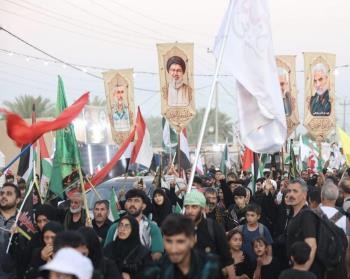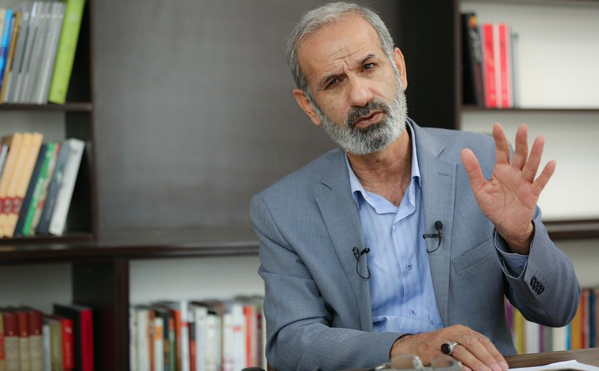Alwaght- The 12-day war Israel waged against Iran in June not only failed to meet the goals of the aggressors, but also transformed the regional atmosphere in favor of Iran. Tehran in the war both showed its resistance to the attack of two aggressors that were equipped with cutting-edge military technology and proved that its domestic nuclear knowledge is not eliminatable with bombing. Alwaght discussed the war and its outcomes with Saadullah Zaree, an West Asia affairs expert.
Alwaght: What were the reasons and goals behind the Israeli war on Iran?
Zaree: The enemy had several times talked about two reasons for its war on Iran. It said that to beat the Iran-led Axis of Resistance they should hit the benches, namely the resistance groups around the region. Also, they said they should directly battle Iran and if they can weaken Iran, the resistance groups will automatically be weakened in the region. The enemy pursued the first, namely hitting the resistance groups, in Gaza, Lebanon, Syria, and Yemen. But it only made some tactical gains in pursuit of this aim.
For example, in Gaza, they occupied part of this Palestinian region, while in Israel the debate now is about whether we should stay in Gaza or evacuate. So the occupation of the land is merely a tactical event, but what Israel was looking for, to solve its problem in Gaza and to ensure that there is no resistance in Gaza, did not achieve this goal. In Lebanon, Hezbollah was also hit, but these strikes are temporary and the resistance will recover soon. So in Lebanon, they did not achieve their goal, and the weakening of Hezbollah is temporary and tactical, and the main aim is to eliminate security threats to Israel from the north. In Syria, Israel has also made a tactical achievement, and despite the destruction of military infrastructure, this infrastructure can be restored, and this situation in Syria can be repaired. In Yemen, Ansarallah was also hit and pressure was exerted on Yemeni ports, but the security threat to Israel from the south posed by the Yemeni resistance was not removed, and Ansarallah's power remains in place. The reason for attacking Iran was Israel's impasse in its first goal, namely in striking the resistance branches. Since this goal did not come to fruition, attacking the head of the resistance was put on the agenda, and attacking Iran means Israel's failure in attacking the resistance's branches.
In attacking Iran, unlike the attacks on Lebanon, Syria, and Yemen, Israel needed US's direct and practical involvement in the war. This situation made it clear that in the face of Iran, Tel Aviv feels weak and is fighting against Iran by relying on military power of the US. In addition, the fact that the conflicts extended from the Mediterranean to the Persian Gulf showed the expansion of the war. The policy of expanding the war isolated Israel, because the need for the expansion of the war requires the involvement of a large number of countries in the war, and this expansion of the war isolated Israel and cost it, since many countries condemned the Israeli attacks. In addition, since the attack on Iran was completely unjustified, it was considered an attack on the legal structures and sovereignty of an independent country, and a wide range of countries were terrified. The Egyptians were worried that the same attack might also be carried out on Egyptian territory. When Israel violated all principles and international laws, there would be a possibility of repeating this situation against any country. Therefore, the attack of June 13 on sites in Iran and the US attack on the Fordow, Isfahan and Natanz nuclear facilities on the 12-day of war were considered as an act of aggression against legal structures, and no one supported these attacks. This indicates Israel's isolation on the international stage. In a situation where Israel was under the question of "why war?" both internally and internationally, this question was not raised to Iran. This atmosphere raised Iran's tolerance threshold. Even if the war had continued for several years, no blow would have been inflicted on Iran's legitimacy, and the Islamic Republic of Iran could have continued the war in a relaxed atmosphere and with the support of its people, but Israel was under internal and external pressure to stop the war. When the US declared the war over, Israel also returned to the ceasefire atmosphere, and when it came to a ceasefire, the Israelis quickly accepted it, but in other wars, for example in Gaza, Tel Aviv has not accepted a ceasefire so far. However, in the war with Iran, Israel quickly accepted Trump's proposal for a ceasefire.
Alwaght: What changes and consequences has the region seen after the 12-day war?
Zaree: An American think tank has raised a question: Has the hegemonic player after the war changed? It answers that Israel is not a hegemonic regional actor. Whispers of another war mean that Trump and Netanyahu have not reached their goals. Actually Trump's claim of victory contradicts intentions for new war against Iran.
The reality is that they did not achieve their goals in the 12-day war. Before the war, and especially two weeks before the war began, the US and Israel believed that they could force Iran to surrender through a military action, and Trump repeated this word many times. The goal of Iran's surrender was the same goal that Israel and the US fought for and paid for to made Iran surrender, but they did not achieve it, and then they came back and said that Iran should come to the negotiating table, and Europe is also putting pressure on Tehran. The Americans were also sending a message of negotiation in the midst of the war, and according to Iran's Foreign Minister Abbas Araghchi, the US representative had repeatedly called for negotiations in the midst of the war. The meaning of this request for negotiations is that they have not been able to achieve their goals through war. Therefore, the request for negotiations means that Iran cannot be contained by force and bombing. Now that they have not been able to contain Iran through war and negotiations, the Americans have moved towards a new theory and are seeking to contain Iran by creating a coalition against Iran and at the same time bombing Iran's nuclear facilities at specific intervals. This is US's naive thinking against Iran, because Washington is not capable of creating a barrier and a wall of siege against Iran. With which countries is this wall and siege on Iran supposed to be? With Russia or China or Saudi Arabia and Turkey? Like the wall that was created during the George W. Bush era, will that siege against Iran last? It impossible to create such a wall around Iran, because neither Turkey and Saudi Arabia, nor Pakistan are in the coalition against Iran, and only Europe can be American partner in the anti-Iran coalition. But Europe is also helpless.
The second issue is that the US claims that whenever Iran resumes nuclear construction, it will bomb again. But one question is, what can the US and Israel do when Iran's nuclear facilities are moved under a mountain? If a nuclear facility is in a certain safe and inaccessible area, what can the enemies do? For example, in the recent war when Iran's yellow cake facility was damaged, what could they do if the same facility was in another safe area? What weapon can they use to bomb a nuclear facility located in safe and impenetrable areas? Did they achieve their goals in the recent bombing? Do they not know at all what happened in Natanz? The enemy generally has no understanding of reality. The Director General of the International Atomic Energy Agency Rafael Grossi, who is himself a spy for the other side, declares that he does not know what happened in Natanz and requests an inspection of Iran's nuclear facilities after the bombing. Despite the fact that the other side has a lot of equipment, they do not know what to do against Iran. Why should we give access to the Agency? Why set up facilities in the Isfahan and Natanz plains? When the Agency is a spy force, why should it monitor Iran's activities? We have now realized that being a member of the NPT does not bring security to Iran. Why should we give access to the Agency? We should move our facilities to protected areas so that they remain safe. Therefore, the enemy did not achieve its goals against Iran in either the first or second stage. Western centers claim that Iran has the capacity to produce 10 nuclear bombs. We neither deny nor confirm these claims, but with the same 400 kilos of 60 percent enriched uranium, Iran can produce 10 low-yield bombs. So the other side has no way back nor forward and has reached a state of desperation with Iran. Although there are costs and damages for us, the other side will also suffer severe damage and will not achieve its goals.
Alwaght: Has the war improved Netanyahu's position internally?
Zaree: The 12-day war caused some excitement in the initial days, but this was transient. The excitement of this war for the Israelis was that Israel had finally attacked Iran, and this picture was attractive to the Israelis, and to a large extent, this picture temporarily stabilized Netanyahu's position at home, but as the war continued, the Israelis were forced to pay the price. People will ask Netanyahu why he started the war when he had no power to fight? Because this excitement was fleeting and Iran was able to attack urban facilities, homes, petrochemical plants, barracks, etc., and that initial excitement of the war for the Israelis disappeared. Therefore, Netanyahu will be asked why he attacked. Netanyahu will be asked if he claims to have destroyed nuclear facilities, why he is looking for another attack. Therefore, the excitement of the war in Netanyahu's favor was only in the first days of the war, and after Iran responded, it gave its place to questioning and criticizing Netanyahu.
Alwaght: Why did not the resistance groups simultaneously step in the war in favor of Iran?
Zaree: There are two matters about this question. First, those who criticize why resistance groups did not enter the war in favor of Iran are actually admitting that resistance groups in Lebanon, Iraq, Yemen, and Palestine are still active. This is against Israel's claim to have destroyed the resistance groups, so criticizing the resistance groups' decline to enter the war contradicts Israel's claim to have destroyed the resistance groups in the past two years.
The second issue is that those who criticize the resistance groups for not entering the war in favor of Iran are actually admitting that Iran entered the war alone and defended itself alone. That is, Iran had neither superior power, nor inferior power, but Iran defended itself independently. Iran itself, as a pillar of defense, forced the enemy to accept a ceasefire. Iran forced the other side to accept a ceasefire in 12 days. When we compare the 12-day war with the long war in Ukraine or the war in Gaza, we see that the war was stopped in a very short time by Iran's will. Iran did not even ask for a ceasefire, rather, it showed its power and applied this power against the opposite side. Before the war, the Leader had emphasized that Iran does not have a proxy force and that there is only one proxy force in the region, called Israel, which is waging war and chaos. We have many capabilities to defend ourselves, and if a war breaks out, Iran will use capabilities that have remained hidden until now, but Israel used its maximum capacities, which included comprehensive security and military support from the US.
I should tell you that in the future war we will have many surprises, but Tel Aviv will not have this surprise because it has exposed its hand and made everything it had public in the 12-day war with the support of Washington. In the 12-day war, the resistance groups were very insistent on joining the war. Both Hezbollah in Lebanon and the resistance forces in Iraq were ready to enter the war with their high capabilities and insisted on entering the war, because they believe that Iran is the stronghold of Axis of Resistance and if Iran is harmed, all the resistance forces in the region will be harmed. Therefore, despite the resistance groups' insistence on entering the war, Iran did not see the need for that.
Alwaght: In general, given the grand event of Arbaeen, how do you see the landscape of the Axis of Resistance in the region?
Zaree: The Muslims' reaction to Iranian missile response to Israel was substantial. They looked at this war as a war of Islam against infidelity. This support was a point of consensus among people of Muslim countries from Indonesia to Morocco. Therefore, a unified Muslim world backed Iran's stance and response. During the Iran-Israel war, hundreds of demonstrations were held in Islamic countries condemning Israeli aggression, vows were made, and declarations of readiness to participate in the war were made. This means that Muslim nations were not afraid, and the recent war created enthusiasm, hope, and self-confidence for Muslims against Israel. Muslims now say, "great that Iran has become the front line of the Islamic world. This situation is detrimental to the US, and the pro-Irranian atmosphere across the Muslim world is terrifying for Americans and hopeful for Iran. The stance of Anwar Ibrahim, the Prime Minister of Malaysia, in supporting Iran was unprecedented. Two years ago, he had decided that Shiite faith is illegal, but the same leader declared in the recent war that he was proud of Iran's attacks. This change in atmosphere is in favor of Iran. Arbaeen is also an atmosphere for gathering these elements and has created an opportunity for Muslims to express themselves.
Each Iranian relatively pays a high amount to travel to Karbala for Arbaeen in the heat of the summer. This year over 3.3 million Iranians traveled to Iraq for Arbaeen congregation. This large number is only from Iran and thy travel on their own costs. If the door is opened for Muslims from Arab countries, each year up to 100 million could travel to Iraq for Arbaeen and this number makes several large armies. This number of people, go to Iraq under difficult conditions, say "Labbayk Ya Hussein (O Hussein, we are at your service) and raise the poster of the [Iranian] Leader of the Revolution. It is, indeed, meaningful and highly intimidating to the Americans, while it is a source of hope and credibility for Iran.



























